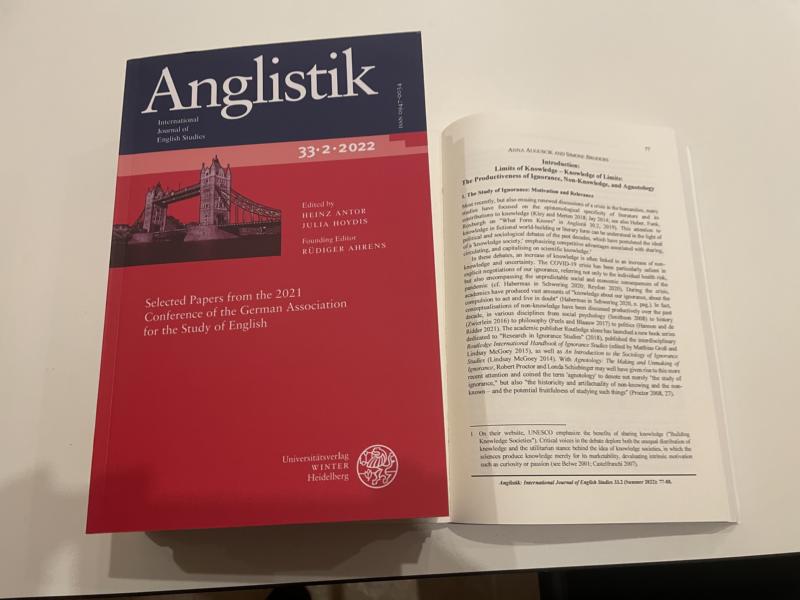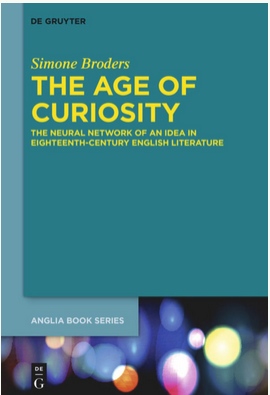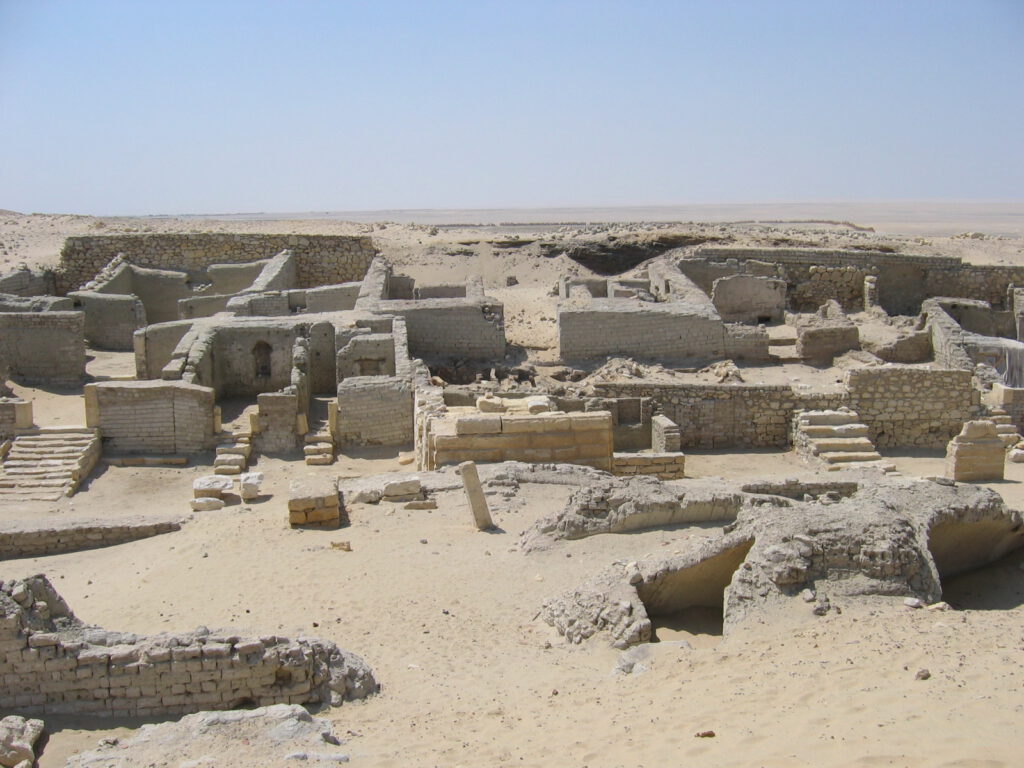Research
Limits of Knowledge – Knowledge of Limits: Re-Thinking Ignorance, Non-Knowledge, and Agnotology in English Literature and Culture from the Enlightenment to an Enlightened Present
Project Website: https://limitsofknowledge.eu
In Collaboration With: Dr. Anna Auguscik, University of Bremen

Anglistik 33.2 (Summer Issue 2022). Selected Papers from the 2021 Conference of the German Association for the Study of English. Selection Editor: Daniela Wawra und Jonathan Rose. Section editors for section “Limits of Knowledge — Knowledge of Limits. The Productiveness of Ignorance, Non-Knowledge and Agnotology in Anglophone Studies, Literature and Culture”: Anna Auguscik and Simone Broders. https://angl.winter-verlag.de/issue/ANGL/2022/2
Most recently, but also ensuing the crisis in the humanities, there has been an increasing number of publications on knowledge in literature, fiction, or literary form (Funk, Huber, and Roxburgh 2019, Kley and Merten 2019, Chodat 2017, Jay 2014). The focus of this project, however, is on how we speak – who and in which contexts – about limits of knowledge and knowledge of limits, as well as what literature may know about not knowing. Non-knowledge, ignorance, gaps, and limits of knowledge have indeed been controversial but also very productive topics in the humanities, for instance in philosophy (Kant, Herder, Humboldt), psychology (Freud), theology and ethics (Cusanus’ docta ignorantia, Jonas’ ethics of responsibility), history (Foucault, Greenblatt, Gallagher, White), and literary theory (Iser’s theory of gaps). In popular science, Richard Dawkins famously referred to phenomena of non-knowledge as “the worship of gaps”, i.e. the faithful acceptance that some problems are ‘not meant to’ be solved (2006: 152). In the social sciences, Matthias Gross suggested to revise Ulrich Beck’s conceptualization of the ‘risk society’ in favour of a “non-knowledge society” (2016).
This project is interested in the contemporary public, scientific, and cultural discourses produced about non-knowledge. Specifically, it aims at probing (a) the assumption that, in the 21st century and ensuing the recent avalanche of crisis-related research, we know more, or even better, about our non-knowledge than ever before; (b) the tangibility of and subjectivity involved in declaring ‘gaps’ in knowledge in the interest of risk management; and (c) the calls for a knowledge-based, rational and specifically Enlightenment-inspired approach to challenges that elicit the construction of states of non-knowledge. The project proposes to engage with the ubiquitous, often programmatic, and strongly affective discussion of non-knowledge, at times even resulting in a ‘non-knowledge industry’, with an approach in three steps that might at first sight appear at odds with the presentism of the debate but which we envision might help precisely to historicize contemporary constructions of non-knowledge. We will (1) examine literary texts and cultural productions from the ‘Long’ Eighteenth Century and (2) compare and contrast these with literary and cultural outputs from the twenty-first. This juxtaposition will be (3) brought in dialogue with the afore-mentioned public, scientific and cultural discourses, illuminating how, with Dipesh Chakrabarty, “in the era of the Anthropocene, we need the Enlightenment […] even more than in the past” (2009: 211), taking advantage of the “seismographic function” (Vermeulen 2020: 23) of literature in identifying disturbances and crises and finding experimental strategies of representing and negotiating them.
Despite the extensive research on non-knowledge accomplished in the natural and social sciences as well as in individual fields of the Humanities such as history and philosophy, little work has thoroughly examined how literary and cultural works explore the limits of knowledge. Without an adequate consideration of literary and cultural discourses on non-knowledge, however, both the scientific community and the media and public debates about the role, impact, and limits of research are likely to undervalue how literary and cultural productions participate in producing narratives, metaphors, and rhetorical patterns recurring in these debates about the ethics of research as well as the potential of science to provide both adequate and feasible solutions to crisis situations.
The project renders visible and proposes attempts to not necessarily remedy this ‘gap’ but add to the dialogue and trace the ensuing changes to the initial constellation of problems by analysing the contribution literature and culture have made to the discourses used when talking about non-knowledge, as well as to the modes of treating areas of non-knowledge. One of the goals of the project lies in establishing criteria to describe the aesthetic ways to perceive and portray non-knowledge and thus come to a better understanding of how these discourses have enacted the potential of non-knowledge for affective politics. Thus, thematically, this project is closely connected to the heuristic potential of the notion of plausibility and ‘tacit knowledge’. Textually, this project is interested in investigating how literature and culture position themselves towards ‘phases’ of discourse on non-knowledge. Furthermore, the interdisciplinary appeal of non-knowledge as a concept and the ‘limits of knowledge’ as a dominant narrative produced about it consists in creating networks of the same patterns describing ignorance in different contexts, providing a systematic framework for historicizing these debates. The historicity of current debates on non-knowledge, as sparked by Habermas and Beck, but also seen in reaction to Anthropocene debates, will be highlighted by adding perspective and dimension through the thorough analysis of such epistemic shifts in the past, particularly during the seminal period of the Enlightenment.
By drawing on both Enlightenment and contemporary perspectives on the limits of knowledge, this project hopes to establish a set of generalizable criteria to analyse recurring patterns of non-knowledge as a literary motif or device, to investigate how non-knowledge is employed as a narrative strategy, and to what end, as well as establish taxonomies of non-knowledge. The aim is to further investigate how literary and cultural productions impact the construction and production of knowledge, how they handle ontological problems implied in the concept of ‘filling the gaps’, and how these constructions have affected real-world approaches to creating knowledge.
The Age of Curiosity: The Neural Network of an Idea in Eighteenth-Century English Literature

Samuel Johnson famously called curiosity “the first passion, and the last”: this study explores diverging concepts of curiosity, taking into account the influences of philosophical aspects of the debate on curiosity in British literature, particularly under the two grand epistemes that shape the ‘Long’ Eighteenth Century: Enlightenment and Romanticism.
The study comprises the time frame between 1660 and 1820, including early groundbreaking contributors to the debate on curiositas in Britain, such as Milton, Bacon, and Browne, the major Neoclassicists, and a variety of non-fiction and minor authors whose work contributes to the formation of curious characters in literature, such as the virtuoso, the voyeur, or the female traveller. The project also includes dramatists such as George Colman the younger, George Lillo, and Joanna Baillie.
A post-Foucauldian history of ideas for the 21st century aims at breaking the illusion of a seemingly fixed, holistic concept of curiosity, striving teleologically from original sin to a celebrated character trait of intellectuals, as Hans Blumenberg described it. Developing an innovative model for Lovejoy’s original unit ideas at work, this project traces their variability through time, individual philosophical system, and dogmatisation. While some famous patristic authors such as St Augustine of Hippo and Thomas Aquinas constructed curiosity as the epitome of sin, Enlightenment philosophy proved to be the prerequisite for transforming this putative vice into a virtue inherent in every human mind. Despite the interest in the exploration of curiosity within the scientific community, a more exhaustive compendium comprising the debate on curiositas from a specifically British perspective in literary criticism constitutes a gap in current literary studies.
History constructed as knowledge of continuity would suggest the existence of an objective ‘truth’ about the past, facts that can be verified; it allows individuals to locate themselves within a historical process (Wischermann 79). Recent models, however, tend to perceive histories in the plural as participation of collective memory as well as individual, subjective memory in constructing identities: “History is a place of experiment, a method to detect difference; knowledge of the other, and therefore, knowledge of ourselves” (Roger Chartier,”Historie oder das Wissen vom Anderen”. Nachwort in Michel de Certeau, Das Schreiben der Geschichte (Frankfurt/M: Campus, 1991), 289-99; 299).
“As if a building was being constructed”: Studien zur Rolle der Geschichte in den Romanen Adam Thorpes. Die erste Monographie zum Romanwerk des britischen Autors.
Als ob ein Gebäude konstruiert würde – so beschreibt Adam Thorpe den Prozess der historiographischen Forschung.Bahn-Schacht, der durch den Boden getrieben wird, stellt sich das Eindringen des Historikers in die Vergangenheit als ein Akt der Gewalt dar. Im Gegensatz zur Gegenwart besitzt die Vergangenheit keine feste Substanz. Der Vergangenheit durch Interpretation eine Struktur aufzuzwingen erscheint als ein ebenso unmögliches Unternehmen wie der Bau einer U-Bahn in der ägyptischen Wüste. Die unterschiedlichen Konzeptionen von Geschichte(n) und Geschichtsschreibung stellen bereits seit dem Erscheinen von Ulverton (1992) zentrale Anliegen des britischen Autors dar.

Ausgrabungsstätte Narmuthis (c) Franziska Naether
Diese erste Monographie zum Romanwerk Thorpes setzt es sich zum Ziel, Diskontinuitäten und Brüche eines Begriffs aufzuzeigen, der angesichts der Multiperspektivität und Polyphonie von Thorpes Romanen ausschließlich im Plural, in Form von erzählten “Geschichten”, denkbar ist.
Diese erste Monographie zum Romanwerk Thorpes setzt es sich zum Ziel, Diskontinuitäten und Brüche eines Begriffs aufzuzeigen, der angesichts der Multiperspektivität und Polyphonie von Thorpes Romanen ausschließlich im Plural, in Form von erzählten “Geschichten”, denkbar ist.
Der theoretische Teil der Arbeit untersucht unterschiedliche Ausprägungen von Geschichtswissenschaft und Gedächtniskultur in der Gegenwart sowie Formen und Phänomene des historischen Romans der Gegenwart im Kontext der so genannten Postmoderne- und posthistoire-Diskussion.Ausgehend von Georg Lukács Untersuchung zum historischen Roman, die auf einem mimetischen Literaturbegriff im platonischen Sinne basiert und eine “konkrete Erfassung der Geschichte als Geschichte” als grundlegendes Desiderat der Gattung des historischen Romans formuliert, ließ sich über die Kritik an dieser Konzeption des historischen Romans im Sinne einer mimetischen Rekonstruktion historischer Fakten eine Erweiterung und Veränderung des Genres nachweisen. Während das mimetische Konzept noch von der Existenz einer objektiven Wirklichkeit ausgeht, bildet sich seit Beginn der Neuzeit mit dem Wirklichkeitsbegriff der “Realisierung eines in sich stimmigen Kontexts” eine neue Auffassung von Realität heraus, welche die Entscheidung über “die Wahrheit” auf das Individuum überträgt. Es kommt zu einer Subjektivierung von Wirklichkeitserfahrung, die sich mit dem Eintritt in die Moderne verstärkt. Blumenbergs Auffassung von Wirklichkeit als Text lässt den Roman schließlich sogar in “Konkurrenz der imaginären Kontextrealität mit dem vorgegebenen Wirklichkeitscharakter der gegebenen Welt” treten und lässt eine Aufwertung des historischen Romans vom rein mimetischen zum genuin poetischen Genre erkennbar werden.
Die Erkenntnis, dass auch die Historiographie keine objektive Imitation der Vergangenheit darstellt, sondern narrative Konstrukte erzeugt, beeinflusst nachhaltig Formen und Inhalte der Gattung des historischen Romans der Gegenwart.
Linda Hutcheon definiert die aus der vorgestellten Entwicklung resultierende neue Ausprägung des historischen Romans der Gegenwart, den sie mit dem Begriff der historiographic metafiction bezeichnet.
Der Skeptizismus gegenüber der Geschichtsschreibung, wie er in den Werken zeitgenössischer Historiker wie etwa Hayden Whites Metahistory zum Ausdruck gebracht wird, stellt eine Parallele zu dem zunehmenden Zweifel postmoderner Romane an empirische und positivistische Auffassungen von Realität – und damit von historischen ‘Fakten’ – dar.
Hayden White illustriert in Metahistory den Übergang vom 19. zum 20. Jahrhundert als eine erkenntnistheoretische Transitions-periode, die schließlich in der von ihm als “Krise des Historismus” bezeichneten Grundstimmung resultierte und somit die Basis für historiographische Selbstreflexivität und eine metafiktionale Auseinandersetzung mit dem Begriff der Geschichte bildete.
Ein holistisches Bild der ‘Menschheitsgeschichte’ ist obsolet geworden, an seine Stelle rückt das individuelle Erinnern von einer bestimmten Perspektive aus in den Vordergrund. Vertreter der historischen Hermeneutik wie Wilhelm Dilthey und Hans-Georg Gadamer nutzen, ähnlich dem literaturwissenschaftlichen Verfahren, von Geschichte und Konvention geprägte Vor-Urteile als produktive Basis für ein höheres Verständnis. Des weiteren gilt laut White der tropologischen Ebene der Interpretation historischer Texte verstärkte Aufmerksamkeit. Die Synthese von Hermeneutik und Historiographie bildet einen weiteren Schwerpunkt der Arbeit.Historiographische Entwürfe, die Whites Forderung, “zur Diskontinuität zu erziehen”, entsprechen, sind beispielsweise in Foucaults Archäologie des Wissens zu sehen, welche unter anderem die Basis der Strömung des New Historicism darstellt.
In Thorpes Romanen existiert kein einheitliches Bild von Wissen um die Geschichte, sie weist vielmehr das Charakteristikum der Unbestimmtheit auf. Die konkurrierenden Versionen von Ereignissen, deren Wahrscheinlichkeit und Wahrheitsgehalt zu beurteilen dem Leser überlassen bleibt, die Umdeutung der Funktionen von Alltagsgegenständen sowie die Befassung mit der retrospektiven Konstruktion möglicher Vergangenheiten durch das Leitmotiv der Archäologie zeigen Diskontinuitäten und Brüche in der Geschichte auf.
Die erste Monographie zum Romanwerk Adam Thorpes untersucht die folgenden Romane unter besonderer Berücksichtigung ihrer Geschichtsdarstellung:
Ulverton (1992)
Still (1998)
Pieces of Light (1998)
Nineteen Twenty-One (2001)
No Telling (2003)
The Rules of Perspective (2005)